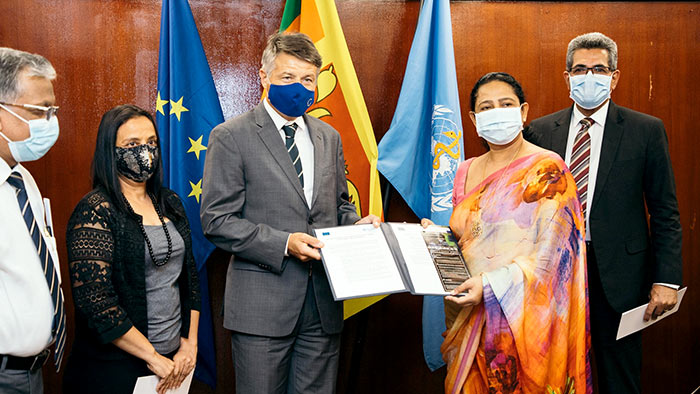EU, WHO granted EUR 2 Million to Sri Lanka to mitigate COVID-19

The World Health Organization country office for Sri Lanka (WHO), with financial support worth EUR 2 million from the European Union (EU), will help improve emergency response capacities in Sri Lanka to mitigate the impact of COVID-19.
The support will focus on several key areas, including enhancing the effectiveness of COVID-19 case management as well as preventing infection.
Developing the system’s case management processes will enable better planning, coordination, and decision-making; additionally, a key component of the grant, the advancement of a learning management system, will sustainably increase the health system’s capacity to respond to public health emergencies in the future.
The funding will also advance existing communication and community engagement efforts, ensuring the generation of relevant and accessible communication materials and supporting the mobilization of vulnerable individuals, young people, and community-based organizations to lead community-level prevention and control measures.
Finally, in recognition of the importance of continuing essential services, EU support will empower communities to access mental health and psychosocial services, addressing inequities exacerbated by the pandemic.
“The funding for Sri Lanka is part of the EU’s global response to the coronavirus pandemic,” said Ambassador of the Delegation of the European Union to Sri Lanka and the Maldives Denis Chaibi.
“The EU partnership with the WHO will not just address the impact on the health sector but also pay special attention to vulnerable populations, working hand-in-hand with local communities. Strengthening response capacities of countries in the South Asian region is an important part of ensuring that we all recover from this crisis together and ‘build back better’”.
Dr Razia Pendse, WHO Representative to Sri Lanka, stated that “as cases continue to increase globally and locally, we are reminded that the pandemic is far from over. The EU’s timely and strategic support will boost implementation of the Sri Lanka Preparedness and Response Plan to COVID-19, focusing on the pillars of case management, risk communication and community engagement, infection prevention and control, and maintaining essential services. The expansion of digital technology for capacity strengthening and continuous learning, through the development of the learning management system will go a long way in responding not only to the current COVID-19 pandemic but also to a better prepared and resilient health system for future.”
Latest Headlines in Sri Lanka
- Sri Lanka allows women to work at night as sanitary and food service workers February 1, 2026
- India pledges INR 4 Billion aid to Sri Lanka in 2026-2027 Budget February 1, 2026
- Shiranthi Rajapaksa summoned to FCID on February 3, 2026 February 1, 2026
- Sri Lanka PM calls for education reform to strengthen nation February 1, 2026
- Sri Lanka revises fuel prices from February 1, 2026 January 31, 2026


